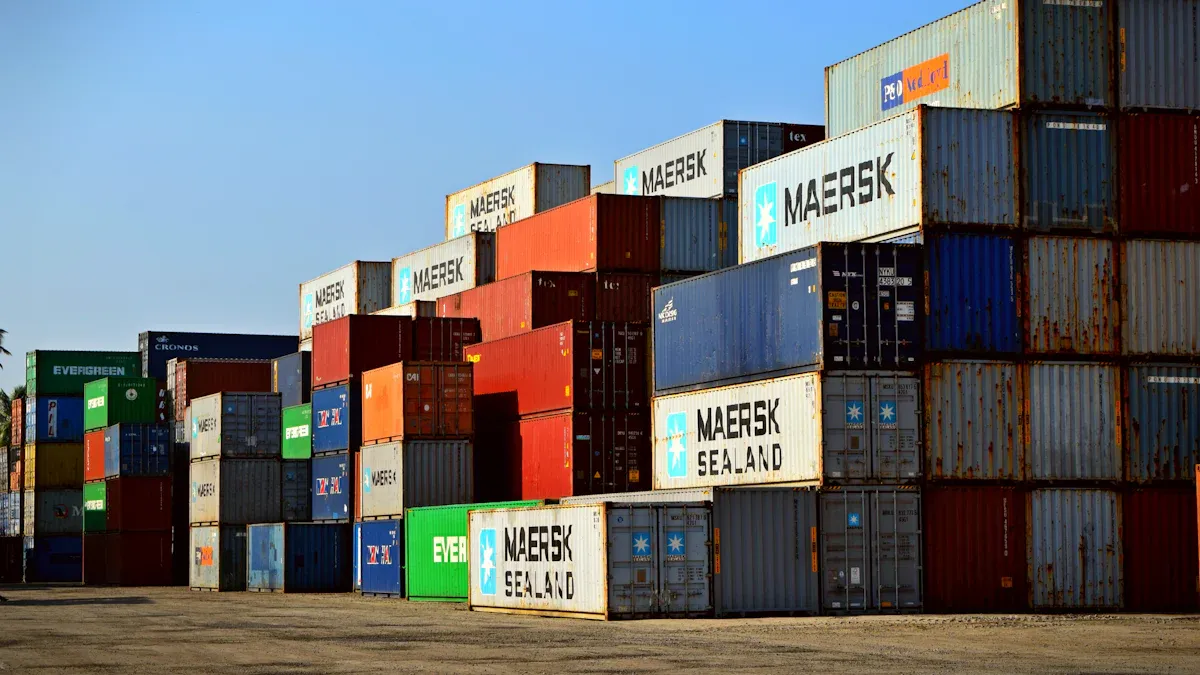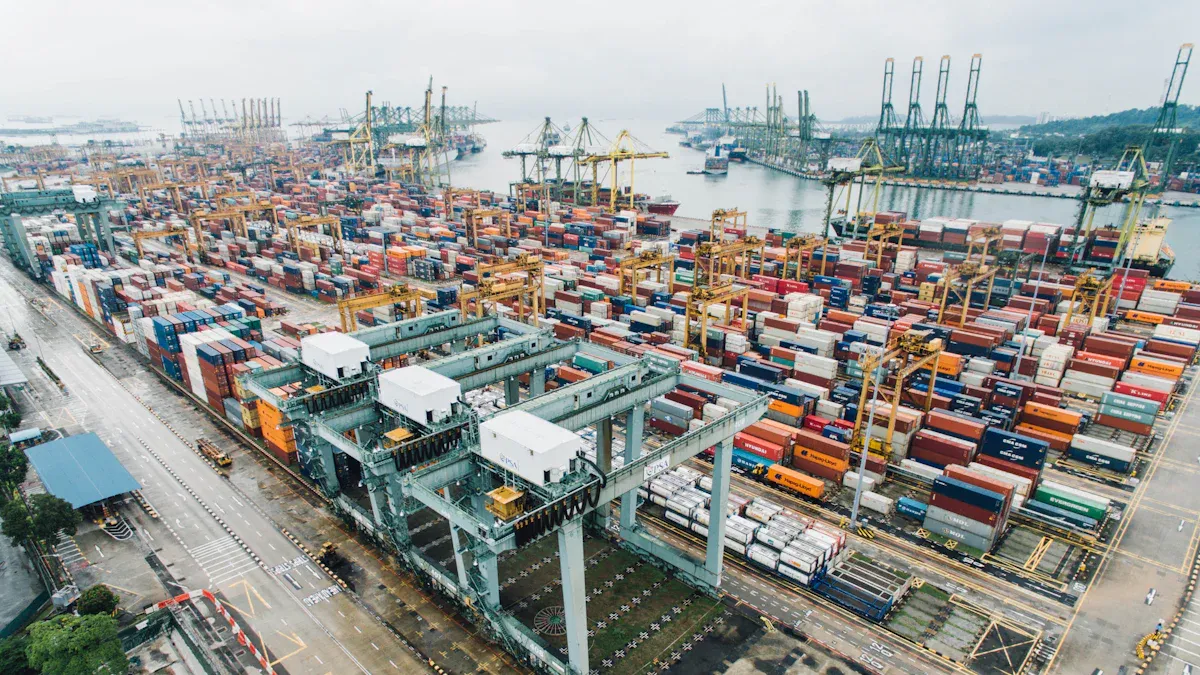Understanding logistics and its role in modern business

Logistics involves managing the flow of goods, services, and information to ensure smooth operations. Its role in modern business is vital. Streamlined logistics processes reduce costs and improve efficiency. For example, optimizing transportation routes minimizes expenses while ensuring timely deliveries. This enhances customer satisfaction by meeting expectations for prompt and accurate service, fostering loyalty and competitiveness.
Year | Market Revenue (USD) | Growth Rate (CAGR) |
|---|---|---|
2024 | N/A | |
2030 | 5,951.0 billion | 7.2% (from 2025 to 2030) |
The logistics industry continues to grow, reflecting its critical role in global trade. Understanding logistics meaning in business helps you appreciate its impact on cost-effectiveness and customer satisfaction, which are essential for success.
Key Takeaways
Logistics is important for moving goods and services smoothly. It lowers costs and makes business work better.
Good logistics management keeps customers happy with on-time deliveries. It builds trust and helps businesses stay competitive.
Using technology and machines in logistics makes work faster. It cuts costs and helps track the supply chain better.
What is logistics and its key components?
Definition and scope of logistics
Logistics involves planning and executing complex operations to manage goods from their origin to their final destination. It includes activities like transportation, warehousing, and inventory management. The goal is to ensure that products reach the right place at the right time in optimal condition. Logistics meaning in business extends beyond just moving goods. It focuses on minimizing costs and improving efficiency, which are critical for operational success. By coordinating short-term and long-term activities, logistics processes enhance the flow of goods and services across the economy.
Key responsibilities within logistics include:
Order processing to connect inventory with customer needs.
Product handling to protect and store goods during transit.
Inventory control to balance stock levels and avoid excess.
Transportation management to move goods efficiently.
Core components of logistics: transportation, warehousing, and inventory management
Transportation forms the backbone of logistics. It ensures goods move efficiently through various methods like road, air, sea, or rail. Warehousing focuses on organizing goods strategically to optimize space and accessibility. Inventory management predicts demand and maintains stock levels to meet customer needs. These components interact seamlessly to ensure efficiency. For example, real-time tracking through IoT and 5G networks enhances visibility, while AI optimizes warehouse operations.
Component | Description |
|---|---|
Transportation | Moves goods efficiently, significantly impacting costs. |
Warehousing | Organizes goods for easy access and space optimization. |
Inventory Management | Balances stock levels to meet demand while minimizing excess. |
The role of JUSDA in the logistics industry
JUSDA plays a pivotal role in the logistics industry by offering tailored logistics services for high-value markets like electronics and automotive. Its JusLink Smart Supply Chain Management Platform provides end-to-end visibility and control, leveraging technologies like RFID and WMS. JUSDA combines global reach with local expertise, ensuring seamless integration and operational efficiency. This approach allows you to benefit from customized solutions that align with your business needs.
The importance of logistics in business
Enhancing operational efficiency and reducing costs
Effective logistics management plays a crucial role in improving your business's operational efficiency. By streamlining processes, you can achieve higher outputs with fewer resources. For example:
Boost efficiency by reducing errors and optimizing resource use.
Improve turnaround times to enhance overall operations.
Use data-driven insights to identify bottlenecks and prioritize improvements.
Efficient logistics operations also reduce costs. Companies that optimize their logistics can eliminate waste, lower transportation expenses, and improve supply chain efficiency. This allows you to reinvest savings into other areas or offer competitive pricing to customers. For instance, timely and reliable deliveries not only cut costs but also enhance customer satisfaction.
Improving customer satisfaction and loyalty
Meeting delivery time expectations is essential for building trust and loyalty. Logistics for companies involves leveraging technology like real-time tracking to provide transparency. Customers can plan their schedules better when they know the exact delivery time. Additionally, route optimization reduces delays, ensuring reliable service.
To further enhance satisfaction, you can offer flexible delivery options and value-added services. These personalized experiences differentiate your business and foster long-term loyalty. Efficient returns management also turns potential negatives into positives, strengthening customer relationships. Companies like DHL and FedEx have demonstrated how tailored logistics strategies can improve service quality and customer retention.
Introduction to JUSDA's 8 Core Products and their impact on logistics
JUSDA's 8 Core Products revolutionize the logistics industry by offering comprehensive solutions across air, land, sea, and rail transport. These services cater to diverse industries, ensuring tailored solutions for your specific needs. For example, JUSDA's cloud warehousing integrates IoT and big data to provide real-time inventory visibility, enhancing customer order fulfillment.
By optimizing transportation networks and leveraging strategic partnerships, JUSDA reduces costs and improves delivery efficiency. Its JusLink Intelligent Supply Chain platform enhances supply chain efficiency through real-time collaboration and data-driven insights. These innovations make JUSDA a leader in effective logistics management, helping businesses meet delivery time expectations and achieve operational excellence.
Logistics and supply chain management: Understanding the relationship
Definition of supply chain management
Supply chain management refers to the coordination of all activities involved in producing and delivering a product or service. It encompasses sourcing raw materials, manufacturing, and distributing finished goods to customers. Unlike logistics, which focuses on the movement and storage of goods, supply chain management takes a broader approach. It integrates various processes to ensure efficiency and customer satisfaction. This holistic view allows you to optimize operations and create value across the entire supply chain.
Key differences between logistics and supply chain management
Although logistics and supply chain management are interconnected, they differ in scope and function. Logistics focuses on moving and storing goods efficiently, while supply chain management oversees the entire process from sourcing to delivery. The table below highlights these differences:
Aspect | Logistics | Supply Chain Management |
|---|---|---|
Scope | Focuses on moving and storing goods efficiently. | Covers the entire process from sourcing to delivery. |
Strategic Level | Involves operational decisions around transportation. | Involves strategic decisions about the supply network. |
Timescales | Short to medium term operations. | Long term strategic planning. |
Value Creation | Offers transportation and storage savings. | Creates value through optimizing the entire process. |
Data Usage | Looks only at lead times and inventory levels. | Takes market trends and supplier performance into account. |
Stakeholder Management | Deals only with transportation and storage relationships. | Includes all stakeholder relationships in the supply chain. |
Understanding these differences helps you appreciate how logistics meaning in business fits into the larger framework of supply chain management.
How JUSDA integrates logistics and supply chain management
JUSDA bridges logistics and supply chain management by offering comprehensive solutions tailored to your needs. Their global reach and local expertise ensure seamless integration across various industries. Key features of JUSDA's approach include:
Providing services like VMI, cross-border logistics, warehousing, and distribution.
Leveraging the JusLink Smart Supply Chain Management Platform for end-to-end visibility and control.
Enhancing operational efficiency through technological integration, such as IoT and big data.
By combining logistics processes with strategic supply chain management, JUSDA helps you achieve operational excellence and meet customer expectations.
Real-world examples of logistics in action

E-commerce and last-mile delivery
E-commerce businesses face unique challenges in last-mile delivery, the final step in the supply chain. This stage accounts for up to 53% of total shipping costs, making it the most expensive and time-consuming part of logistics. Common issues include failed deliveries, inefficient routing, and lack of transparency. You can address these challenges by adopting innovative solutions:
Use alternative transportation modes like bicycles or electric scooters to navigate urban congestion.
Leverage technology for route optimization to enhance delivery efficiency.
Provide real-time updates to customers to improve their experience and satisfaction.
Improving customer-warehouse proximity and investing in delivery optimization technology also reduce costs and enhance efficiency. By addressing these issues, you can ensure smoother operations and better customer satisfaction.
JUSDA's role in global shipping and trade
JUSDA plays a vital role in the logistics industry by facilitating global shipping and trade. Operating across North America, Europe, and Asia, JUSDA designs tailored logistics solutions to meet the specific needs of each market. Its advanced digital tools, like dynamic inventory management and real-time tracking, provide visibility and control. These technologies allow you to proactively manage potential supply chain issues, ensuring seamless integration and operational efficiency. JUSDA’s holistic approach covers every aspect of the supply chain, making it a trusted partner for businesses worldwide.
Industry-specific logistics solutions by JUSDA
JUSDA specializes in logistics solutions tailored to industries like high-tech, automotive, and eCommerce. Its JusLink platform, powered by AI and IoT, enhances operational efficiency and provides real-time insights. For example, JUSDA’s solutions for the automotive sector streamline the movement of parts and finished vehicles. In eCommerce, JUSDA optimizes last-mile delivery to meet dynamic consumer demands. By addressing the unique needs of each industry, JUSDA ensures that your business benefits from efficient and reliable logistics services.
Emerging trends in the logistics industry

The role of technology and automation in logistics
Technology and automation are transforming logistics by improving efficiency and reducing costs. Automation tools like predictive analytics enhance operational performance by integrating global logistics systems. Artificial intelligence (AI) plays a key role in processing freight information and optimizing decision-making. For example, AI-powered route optimization reduces delivery times by 25%, while automated inventory management decreases holding costs by 30%. These advancements also improve supply chain visibility, enabling real-time shipment tracking and boosting operational efficiency by 12%.
Companies like DSV in Denmark have invested heavily in automation, creating fulfillment factories to test new technologies. Self-managed services allow businesses to onboard clients quickly without external providers, increasing agility. Cybersecurity has also become indispensable, protecting sensitive data in an increasingly digital landscape. By adopting these innovations, you can enhance customer experiences through transparency and personalized solutions.
Sustainability and green logistics initiatives
Sustainability is a growing focus in logistics. Companies are adopting green transportation methods, such as efficient routing and clean vehicles, to reduce emissions. Eco-friendly warehousing practices, including energy-efficient designs and the use of sustainable materials, lower costs and minimize waste. Collaboration with suppliers to implement green practices further reduces supply chain emissions.
Initiative Type | Description | Benefits |
|---|---|---|
Green Transportation | Efficient routing, clean vehicles | Reduced emissions |
Eco-friendly Warehousing | Energy efficiency, eco-materials | Lower costs, less waste |
Supplier Collaboration | Green practices, partnerships | Reduced supply chain emissions |
Adopting green logistics practices benefits both businesses and the environment. You can decrease gas emissions, reduce waste, and strengthen customer relationships. These efforts also enhance brand credibility, positioning your business as a responsible industry leader.
JUSDA's innovations in AI and data-driven logistics
JUSDA leads the way in AI and data-driven logistics solutions. Its JusLink platform integrates AI and IoT to improve logistics efficiency and provide real-time insights for better decision-making. For example, AI-driven predictive maintenance helps JUSDA foresee equipment failures, reducing downtime and enhancing efficiency. Traffic data analysis optimizes routing, minimizing delays and fuel consumption.
JUSDA also employs dynamic inventory management and automated procurement to streamline supply chain operations. These tools enable real-time tracking and analytics, allowing you to address issues proactively. By supporting industries like high-tech, automotive, and eCommerce, JUSDA ensures tailored solutions that meet specific needs. Its innovations demonstrate how technology can revolutionize logistics and supply chain management.

JUSDA Solutions
To provide you with professional solutions and quotations.
Logistics ensures the seamless movement of goods through demand planning, inventory management, and transportation. It drives business success by reducing costs, enhancing customer satisfaction, and enabling global trade. JUSDA leads the industry with innovative solutions, focusing on automation and digital platforms to meet the growing demand for efficient logistics in a globalized economy.
See Also
Transforming Logistics Through Innovative Supply Chain Solutions
The Importance of Security in Supply Chain Logistics
Embracing Digital Technology for Future Logistics Solutions
